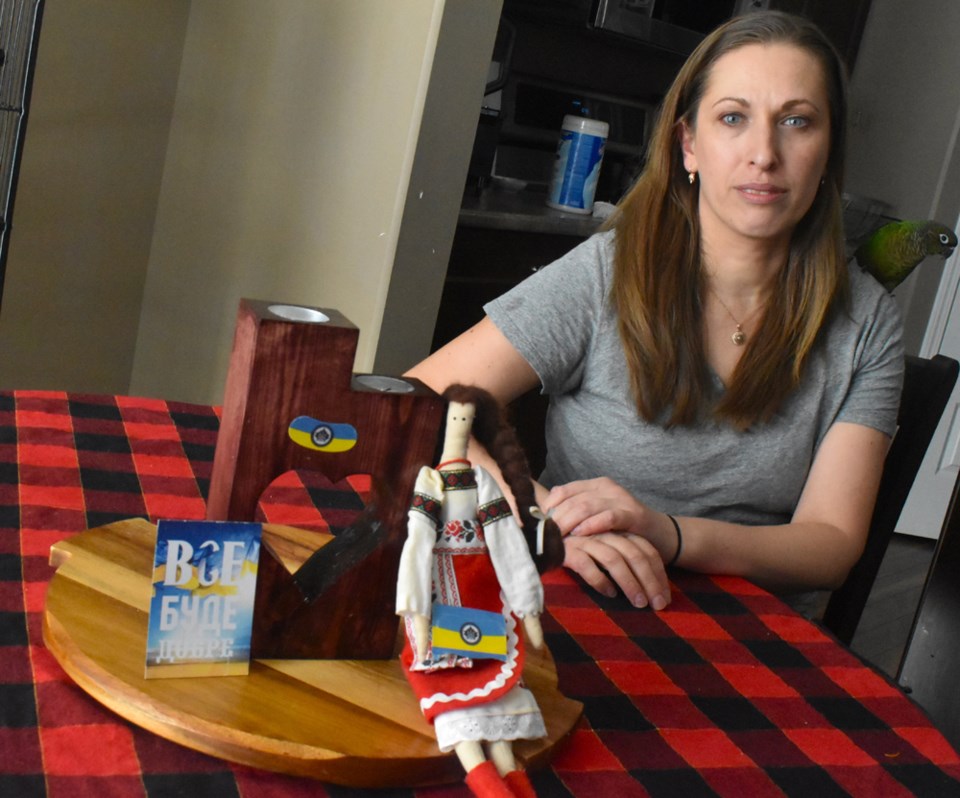MARTENSVILLE — Kateryna Soloviova is thousands of miles away from Ukraine but she’s keeping a close watch on what’s going on in her homeland, especially since Russia began marching in with the possible goal of taking it back into the fold of the former Soviet Union.
Soloviova, who arrived in Canada eight years ago, has relatives in Ukraine. Her parents live on a farm in the southwestern village of Novoselivka near the Ukraine-Moldova border. Her sister, however, is in the capital Kyiv as a member of a volunteer organization that helps the Ukrainian army.
Soloviova is thankful for the Canadian and provincial governments' assistance to Ukrainians in providing support, including the hotline where one can check on the situation in Ukraine and counselling service, by phone or online, if one wants to talk to a mental health expert.
She thinks Russia is trying to stop the further expansion of the North Atlantic Treaty Organization’s influence in Eastern Europe as Ukraine is applying to become a member of the 30-country intergovernmental military alliance. Russian President Vladimir Putin wants Western leaders to deny Ukraine NATO membership.
NATO, however, has an open-door policy where any European country can join the alliance, but the decision of accepting a new member state is discussed by the entire body. The treaty signed by the United States, Europe and Russia more than 70 years ago does not include any provisions on NATO membership.
The NATO website also stated that no promise was made to Russia that they won’t expand after the Cold War. NATO opened its membership after it was formed in 1949 where Article 10 of their founding treaty stated that any European country “in a position to further the principles of this Treaty and to contribute to the security of the North Atlantic” can apply for membership.
“NATO has military bases in Estonia and Latvia, but not in Ukraine. But, if Ukraine becomes a member they might build a base there with a peacekeeping force. That is a real danger for Russia because it will be too close to attack any Russian city from Ukraine. So, they are scared,” said Soloviova.
Soloviova says she believes Russia is a bully and should not meddle with Ukraine’s internal affairs, like Putin’s government has done in supporting separatist rebels in Donetsk and Luhansk regions.
The Donetsk People’s Republic and Luhansk People’s Republic declared their independence in 2014 with Russia the only United Nations member country recognizing them.
“They say that the Ukrainian army bombed civilian people there so Russia needs to come and rescue them. That’s the excuse, but I don’t believe it because [leaders] need to take care of their people. [Russia] is supplying the [separatists] troops because they are friends. But the issue is between Ukrainians. The government must talk to the rebels and discuss peace,” she added.
With the bombings, shelling and fighting that has been going on, Soloviova is concerned about the safety of her fellow Ukrainians in their country and also the rich cultural landmarks that have been preserved for hundreds of years.
“We have a beautiful history and a beautiful city with old but preserved buildings that tourists come to see from all over the world. We have museums, theatres, libraries and universities, but Russia went in and it might get destroyed,” said Soloviova.
For now, she’s leaning on the support of her family and community here in Saskatchewan while hoping that her relatives in Ukraine are safe and that the Russian offensive to her country will stop with parties involved finding a peaceful solution to end the conflict.
Russia, which annexed Crimea in 2014, began its invasion of Ukraine on Feb. 24 by launching separate attacks, with troops coming from Belarus while also conducting missile attacks in dozens of cities across the country. Russia has also supported anti-government separatists in the Donetsk and Luhansk regions, which had declared their independence.
Thousands have already left the capital Kyiv to escape the fighting, with more than 300,000 women and children enduring the cold just to cross the border to the neighbouring countries of Poland, Hungary, Moldova, Slovakia and Romania. Men aged 18 to 60 were prevented from leaving the country so they can fight.
Around 1.4 million Canadians have full or partial Ukrainian ancestry, Canadian citizens of Ukrainian descent, or Ukrainian-born people who immigrated to Canada. Saskatoon is sixth in Canadian cities that have a large Ukrainian population behind Winnipeg, Man., Edmonton and Calgary, Alta., Vancouver, B.C., and Toronto. Ont.






